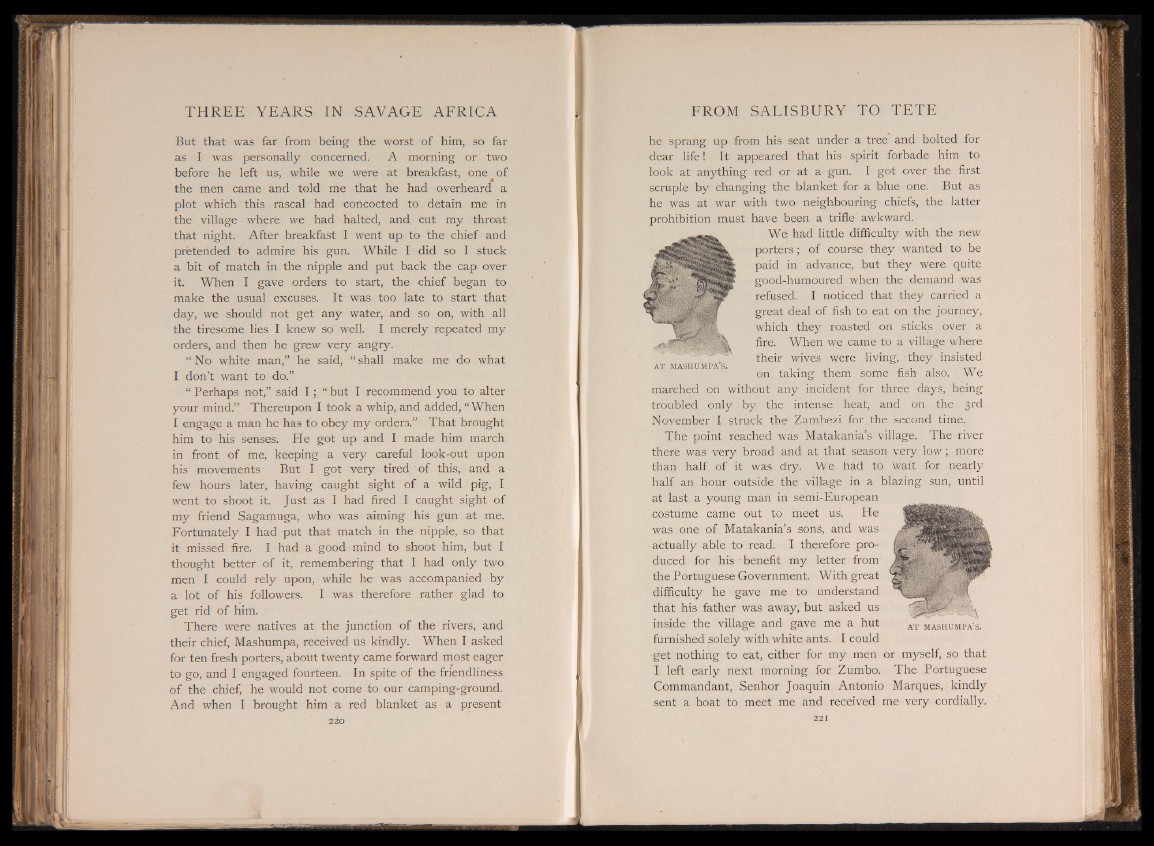
But that was far from being the worst of him, so far
as I was personally concerned. A morning or two
before he left us, while we were at breakfast, one • of
the men came and told me that he had overheard a
plot which this rascal had concocted to detain me in
the village where we had halted, and cut my throat
that night. After breakfast I went up to the chief and
pretended to admire his gun. While I did so I stuck
a bit of match in the nipple and put back the cap over
it. When I gave orders to start, the chief began to
make the usual excuses. It was too late to start that
day, we should not get any water, and so on, with all
the tiresome lies I knew so well. I merely repeated my
orders, and then he grew very angry.
“ No white man,” he said, “ shall make me do what
I don’t want to do.”
“ Perhaps not,” said I ; “ but I recommend you to alter
your mind.” Thereupon I took a whip, and added, “When
I engage a man he has to obey my orders.” That brought
him to his senses. He got up and I made him march
in front of me, keeping a very careful look-out upon
his movements But I got very tired of this, and a
few hours later, having caught sight of a wild pig, I
went to shoot it. Just as I had fired I caught sight of
my friend Sagamuga, who was aiming his gun at me.
Fortunately I had put that match in the nipple, so that
it missed fire. I had a good mind to shoot him, but I
thought better of it, remembering that I had only two
men I could rely upon, while he was accompanied by
a lot of his followers. I was therefore rather glad to
get rid of him.
There were natives at the junction of the rivers, and
their chief, Mashumpa, received us kindly. When I asked
for ten fresh porters, about twenty came forward most eager
to go, and I engaged fourteen. In spite of the friendliness
of the chief, he would not come to our camping-ground.
And when I brought him a red blanket as a present
220
he sprang up from his seat under a tree and bolted for
dear life! It appeared that his spirit forbade him to
look at anything red or at a gun. I got over the first
scruple by changing the blanket for a blue one. But as
he was at war with two neighbouring chiefs, the latter
prohibition must have been a trifle awkward.
We had little difficulty with the new
porters; of course they wanted to be
paid in advance, but they were quite
good-humoured when the demand was
refused. I noticed that they carried a
great deal of fish to eat on the journey,
which they roasted on sticks over a
fire. When we came to a village where
their wives were living, they insisted
on taking them some fish also. We
AT MASHUMPA'S.
marched on without any incident for three days, being
troubled only by the intense heat, and on the 3rd
November I struck the Zambezi for the second time.
The point reached was Matakania’s village. The river
there was very broad and at that season very low; more
than half of it was dry. We had to wait for nearly
half an hour outside the village in a blazing sun, until
at last a young man in semi-European
costume came out to meet us. He
was one of Matakania’s sons, and was
actually able to read. I therefore produced
for his benefit my letter from
the Portuguese Government. With great
difficulty he gave me to understand
that his father was away, but asked us
inside the village and gave me a hut AT m a s h u m p a ’s .
furnished solely with white ants. I could
get nothing to eat, either for my men or myself, so that
I left early next morning for Zumbo. The Portuguese
Commandant, Senhor Joaquin Antonio Marques, kindly
sent a boat to meet me and received me very cordially.